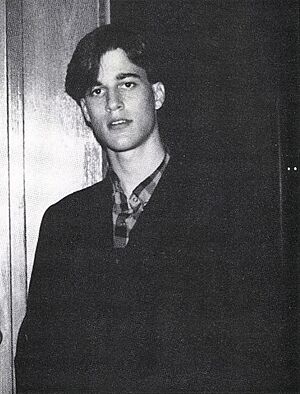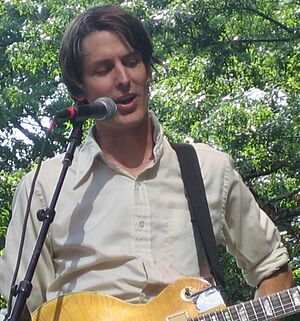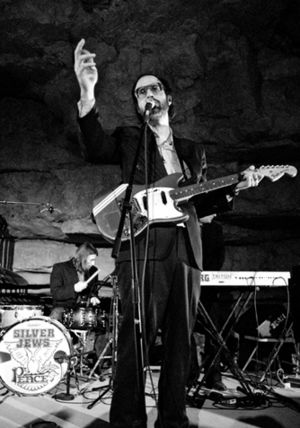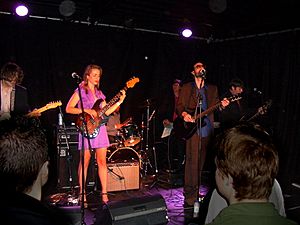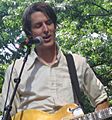David Berman (musician) facts for kids
Quick facts for kids
David Berman
|
|
|---|---|
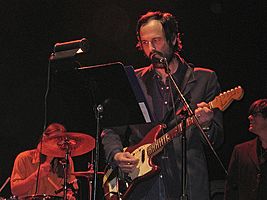
Berman performing with Silver Jews at Webster Hall in 2006
|
|
| Born |
David Craig Berman
January 4, 1967 Williamsburg, Virginia, U.S.
|
| Died | August 7, 2019 (aged 52) New York City, U.S.
|
| Alma mater | |
| Occupation |
|
| Years active |
|
| Spouse(s) |
Cassie Berman
(m. 1999; sep. 2018) |
| Parent(s) |
|
| Musical career | |
| Origin | Hoboken, New Jersey, U.S. |
| Genres | |
| Instruments |
|
| Labels | Drag City |
| Signature | |
David Cloud Berman (born David Craig Berman; January 4, 1967 – August 7, 2019) was an American musician, singer, and poet. In 1989, he started the indie rock band Silver Jews. He formed the band with Pavement's Stephen Malkmus and Bob Nastanovich. David was the only member who stayed with Silver Jews until the band ended in 2009.
With Stephen Malkmus, he helped create a simple country-rock sound. This sound was heard in the early lo-fi recordings of both Pavement and Silver Jews. David focused a lot on writing his unique and personal song lyrics.
His only book of poems, Actual Air, came out in 1999. He went on tour for the first time with his wife, Cassie Berman, but the band soon broke up. After taking a break from music, he started a new band called Purple Mountains. They released their first album, Purple Mountains, in July 2019. David passed away in August 2019.
Even though David Berman felt his work wasn't always appreciated, he had many dedicated fans. He is seen as an important and inspiring figure in indie rock music.
Contents
Biography
Growing Up
David Craig Berman was born on January 4, 1967, in Williamsburg, Virginia. His father, Richard Berman, worked as a lobbyist. His mother was a housewife. David grew up mostly in Texas. He later said he felt like an outsider when he was young.
David's parents divorced when he was seven. After that, he spent time living with both parents. He described his childhood as difficult. He also had a challenging relationship with his father from a young age. David struggled with depression throughout his life.
In high school, David found inspiration in the new wave music scene in Dallas. He enjoyed bands like The Cure and New Order. He also started writing poetry, hoping it would be like the lyrics of punk singers. Reading books was very important to him. He felt it helped him understand others, especially those who were also struggling.
In 1985, David went to the University of Virginia. There, he met Stephen Malkmus, Bob Nastanovich, and James McNew. They often went to concerts and talked about music together. The four of them formed a band called Ectoslavia. David graduated in 1989 with a degree in English literature.
Starting Silver Jews: 1989–1994
After college, David, Stephen, and Bob moved to Hoboken, New Jersey. In 1989, they started their band, Silver Jews. They recorded their first songs in their living room. At the same time, Stephen Malkmus's band, Pavement, released their first music.
David and Stephen worked as security guards at the Whitney Museum of American Art. David wrote lyrics and poems during his shifts. The art in the museum also inspired him. Stephen Malkmus said David was kind and eager to be involved in music.
Even though David sometimes felt Silver Jews was seen as less important than Pavement, the connection helped him. He signed with the indie record label Drag City. This label would release all of his albums. The link to Pavement helped Silver Jews gain a wider audience. This meant David didn't have to tour much at first.
After their first short albums, David went to the University of Massachusetts Amherst. He studied for a master's degree in poetry. He felt this time helped him believe he could be a writer. He tried to get his poems published but was not successful. This made him more interested in music, even though he wasn't a strong singer or guitar player yet.
By 1994, Silver Jews had enough songs for their first album, Starlite Walker. This album earned them respect in the indie rock world. Stephen Malkmus and Bob Nastanovich were busy with Pavement, so David became the main songwriter for Silver Jews. The band's members often changed, but David always led their creative direction.
Break from Music: 2009–2017
On January 22, 2009, David Berman announced that Silver Jews would stop making music. Their last show was a week later in Tennessee. He said he always wanted to stop before the band's music became less good.
When the band broke up, David also shared something personal. He publicly said that his father was the lobbyist Richard Berman. David had a difficult relationship with his father. After Silver Jews ended, David became more private.
In 2009, David published a book of cartoons called The Portable February. He also worked with German artist Friedrich Kunath on a book called You Owe Me a Feeling (2012). David's wife, Cassie, started a career helping children.
By 2016, David had lost both his friend Dave Cloud and his mother. These losses deeply affected him. He even changed his middle name to Cloud in honor of his friend. He wrote a song called "I Loved Being My Mother's Son." David was still in touch with Stephen Malkmus. He also stayed close with Silver Jews drummer Brian Kotzur. At one point, David thought about writing new Silver Jews songs. But he became more interested in creating a new style of music.
Purple Mountains and His Passing: 2018–2019
In 2018, David and Cassie separated. He moved into a room above the Drag City record label office in Chicago. David felt his ongoing depression made it hard for him to be a husband. However, he and Cassie remained close.
David had become less connected to his earlier beliefs. But he still had a passion for music. He even helped a musician named Yonatan Gat get signed to Drag City. In 2018, David helped produce Yonatan Gat's album. By that year, David had a new idea for returning to music. He decided on a new band name: Purple Mountains.
After releasing two songs, the Purple Mountains album came out in July 2019. The album received very positive reviews. Many people saw it as a new beginning for David Berman. He worked on the album with the band Woods and his friend Dan Auerbach. Dan Auerbach called David "one of [his] heroes."
David's financial struggles and the end of his marriage were reasons for his new music. He hoped the tour would help him with his debts. He also talked about touring with other musicians, but it didn't happen. He was worried about touring because of his depression. But he was also excited for his "solitude to end."
In June 2019, David said he often felt unsure if he would make it through the night. David Berman passed away on August 7, 2019, in New York. A private funeral was held for his friends and family. Many people felt his music was more important than ever after his passing.
Artistry
Lyrics
David spent most of his creative time writing lyrics. He would work on them very carefully, sometimes for months on a single line. He wanted his audience to understand his abstract lyrics. So, he often paired them with simple melodies and rhymes.
His songs often used ideas from country music. They focused on themes like music, nature, beauty, and feeling disconnected. Religion was also a common theme in Silver Jews albums. His last album, Purple Mountains, explored ideas from Jewish mysticism.
From the album Bright Flight onwards, his lyrics became more personal. They were almost like a memoir. He talked about his isolation, his divorce, and death. By this point, his music had less humor and was more direct.
In earlier Silver Jews albums, David used made-up characters to show his feelings. These characters were often a mix of real people and fictional ideas. His stories often started simply and then became very strange. His songs created a unique, sometimes absurd, world.
David's lyrics were highly praised. They were seen as influential for other indie rock musicians. Pitchfork magazine called him one of the most influential musicians of his time.
Sound
The early music of Silver Jews had a very lo-fi (low-quality recording) sound. It was seen as artistic within the style of traditional pop songs. Their earliest recordings are known for being very lo-fi. As the band's members changed, David's musical style became simpler. The band moved more towards a country sound. Purple Mountains moved away from their earlier punk rock style.
David's singing was often described as direct and calm. He would sometimes sing and speak at the same time. Reviewers noted his voice had a slightly country feel.
Silver Jews songs were often simple, usually with only three or four chords. David knew his musical skills were limited. The lo-fi sound at first helped hide this. He later became more confident in his musical style.
David spent a lot of time thinking about and refining his albums. He usually wrote the music first. For the first four Silver Jews albums, David wrote all the songs himself.
Cassie, David's wife, brought a calm presence to his energetic performances. David was seen as a natural performer. He often read his lyrics from a music stand. This created a small barrier between him and the audience. Cassie said David's early performances were like a child learning to ride a bicycle.
Poetry
David started writing poems because he felt unsure about his musical abilities. He spent the same amount of time on both music and poetry, usually two or three hours a day. Poetry was a more intense effort for him. He rewrote his poems and lyrics many times.
He began trying to get his poems published when he was 22. This was two years before he felt he wrote his "first worthwhile song." Even though his lyrics and poetry were different, critics found they shared common traits. These included:
- direct language;
- clever writing;
- vivid descriptions;
- references to Judaism;
- themes of American culture, absurdism, and everyday sadness;
- and a mix of reality and symbols, often using images from cities.
Unlike his music, David's poetry did not use rhyme. The poems in Actual Air were written in free verse (without a set rhyme or rhythm). David said he didn't know much about poetry forms. He thought his structure was accidental or natural. He was influenced by poets like James Tate and Emily Dickinson.
David's poetry has received much praise. One critic compared his poetry collection Actual Air to a novel. The world he created in his poems was unique and strange. It often took familiar ideas and made them bizarre. For example, he wrote about "police officers [who] slowdance with target range silhouettes."
Critics said David mastered opening lines, surprising images, and warm, abstract ideas. They also noted his skill in knowing when to use certain words. The connection between David's lyrics and poetry strengthened his artistic legacy.
Public Image and How He Saw Himself
David was very aware of how he was seen by the public. After Purple Mountains came out, he worried people would only see him as a sad person. He had wanted to show a less harsh side of himself. He often thought about the stories he created about himself.
He kept track of musicians who mentioned him in interviews. He believed his music was not appreciated enough. He never thought highly of his own work, except for his lyrics. He didn't see Silver Jews as a band that other bands would talk about. Even though he once wanted outside approval, he refused to read reviews or articles about himself. By 2005, he even used a special device on his computer to block himself from reading them.
David was surprised that his songwriting got more attention than his poetry. He thought of himself more as a poet than a songwriter. He didn't fully see himself as a songwriter until his album Tanglewood Numbers came out. Others saw him as a sincere poet.
David was seen as a "cult hero" partly because he avoided promoting his music. His early refusal to tour created a sense of mystery around him. He reportedly refused to let his record label promote his music. David relied on word-of-mouth and positive reviews. However, he didn't think he was highly praised by critics. He felt ignored by them. He also felt mixed about not reaching a larger audience. He believed his band's sound and his singing style contributed to their smaller audience.
Fans found David's mix of simple and complex ideas relatable. By 2006, he was known as a unique artist. He gained a reputation as "perhaps the finest lyricist of his generation." His hard work was often discussed. David's return to music brought a warm and personal response from major publications. Many felt that concern for David was a big part of his loyal fanbase.
Posthumous Tributes
Many artists honored David Berman after he passed away. Stephen Malkmus and Bob Nastanovich spoke about his death. They also performed shows in his memory. Drag City released a tribute song. It was a cover of "The Wild Kindness" sung by Bill Callahan, Will Oldham, and Cassie. Two months after his death, two albums of cover songs were released.
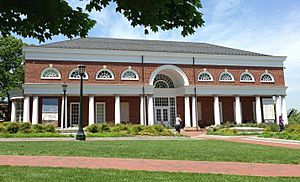
Several musicians mentioned or paid tribute to David in their albums. The Avalanches and Cassandra Jenkins quoted him. Fleet Foxes and Mogwai remembered David in their songs. Bill Callahan described his album with Will Oldham as "all of Drag City coming together for David." The Mountain Goats dedicated a song to him. Other artists also dedicated their works to David.
The Tennessee Titans, David's favorite football team, displayed a message on their stadium screen. It read: "Nashville (and the world) will always love David Berman." Many major publications wrote tributes and obituaries for him. Fans shared his lyrics and other tributes online. Some viewers criticized the 62nd Annual Grammy Awards for not including David Berman in their memorial segment.
After his son's death, Richard Berman released a statement. He said: "Despite his difficulties, he always remained my special son. I will miss him more than he was able to realize."
Discography
- With Silver Jews:
- Starlite Walker (1994)
- The Natural Bridge (1996)
- American Water (1998)
- Bright Flight (2001)
- Tanglewood Numbers (2005)
- Lookout Mountain, Lookout Sea (2008)
- With Purple Mountains:
- Purple Mountains (2019)
Other Credits
| Title | Year | Artist | Notes | Ref. |
|---|---|---|---|---|
| Thank You | 1995 | Royal Trux | Wrote lyrics for "Granny Grunt" and "(Have You Met) Horror James?" | |
| Joya | 1997 | Will Oldham | Wrote lyrics for "Apocalypse, No!" (not credited) | |
| Sings Greatest Palace Music | 2004 | Will Oldham (as Bonnie "Prince" Billy) | Helped with vocals on "New Partner"; sang on "No More Workhorse Blues" | |
| Singlewide | 2009 | The Dexateens | Sang on "Can You Whoop It" | |
| "A Cowboy Overflow of the Heart" | 2012 | The Avalanches | Provided vocals and words | |
| Wildflower | 2016 | The Avalanches | Provided vocals and words on "Saturday Night Inside Out" | |
| Universalists | 2018 | Yonatan Gat | Was the producer |
Books
- Actual Air (1999)
- The Portable February (2009)
Images for kids
See also
 In Spanish: David Berman (músico) para niños
In Spanish: David Berman (músico) para niños
 | Claudette Colvin |
 | Myrlie Evers-Williams |
 | Alberta Odell Jones |


